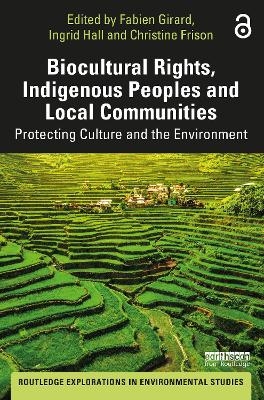
Biocultural Rights, Indigenous Peoples and Local Communities
Routledge (Verlag)
978-1-032-00081-7 (ISBN)
With Biocultural Community Protocols (BCPs) or Community Protocols (CPs) being increasingly seen as a powerful way of tackling this immense challenge, this book investigates these new instruments and considers the lessons that can be learnt about the situation of indigenous peoples and local communities. It opens with theoretical insights which provide the reader with foundational concepts such as biocultural diversity, biocultural rights and community rule-making. In Part Two, the book moves on to community protocols within the Access Benefit Sharing (ABS) context, while taking a glimpse into the nature and role of community protocols beyond issues of access to genetic resources and traditional knowledge. A thorough review of specific cases drawn from field-based research around the world is presented in this part. Comprehensive chapters also explore the negotiation process and raise stimulating questions about the role of international brokers and organizations and the way they can use BCPs/CPs as disciplinary tools for national and regional planning or to serve powerful institutional interests. Finally, the third part of the book considers whether BCPs/CPs, notably through their emphasis on "stewardship of nature" and "tradition", can be seen as problematic arrangements that constrain indigenous peoples within the Western imagination, without any hope of them reconstructing their identities according to their own visions, or whether they can be seen as political tools and representational strategies used by indigenous peoples in their struggle for greater rights to their land, territories and resources, and for more political space.
This volume will be of great interest to students and scholars of environmental law, indigenous peoples, biodiversity conservation and environmental anthropology. It will also be of great use to professionals and policymakers involved in environmental management and the protection of indigenous rights.
The Open Access version of this book, available at www.taylorfrancis.com, has been made available under a Creative Commons Attribution-Non Commercial-No Derivatives 4.0 license
Fabien Girard is an Associate Professor in the Faculty of Law at Université Grenoble Alpes (UGA), France, and also a former Research Fellow, Maison Française d’Oxford (MFO), UK. He is the co-editor of The Commons, Plant Breeding and Agricultural Research (2018). Ingrid Hall is an Associate Professor of anthropology at the University of Montréal, Canada, and an associate member of the Unité mixte de recherché Savoirs, Environnements, Sociétés (UMR SENS), France. She is the co-editor of Savoirs Locaux en Situation (2019). Christine Frison is an FNRS Post-Doctoral Researcher and Lecturer at the Institute for Interdisciplinary Research in Legal Sciences of the UCLouvain, Belgium. Her latest books are The Commons, Plant Breeding and Agricultural Research (2018) and Redesigning the Global Seed Commons (2018).
1. Community Protocols and Biocultural Rights: Unravelling the Biocultural Nexus in ABS Part 1. Conceptual Insights: Biocultural Diversity, Biocultural Rights and Space Making 2. A Biocultural Ethics Approach to Biocultural Rights: Exploring Rights, Responsibilities and Relationships through Ethics Initiatives in Canada 3. Sumaq kawsay (Good Living) and Indigenous Potatoes: On the Delicate Exercise of Ontological Diplomacy 4. Unmaking the Nature/Culture Divide: The Ontological Diplomacy of Indigenous Peoples and Local Communities at the CBD 5. From Obstruction to Decolonization? Contested Sovereignty, the Seed Treaty, and Biocultural Rights in the U.S./Turtle Island and Beyond 6. The Legal Framework Behind Biocultural Rights: An Analysis of their Pros and Cons for Indigenous Peoples and for Local Communities Part 2. Biocultural Community Protocols, Access and Benefit-Sharing and Beyond 7. Community Protocols as Tools for Collective Action beyond Legal Pluralism – the Case of Tracks in the Salt 8. Biocultural Rights and Protocols in the Pacific 9. The Khoikhoi Community’s Biocultural Rights Journey with Rooibos 10. Biocultural Community Protocols and Boundary Work in Madagascar: Enrolling Actors in the Messy World(s) of Global Biodiversity Conservation Part 3. Biocultural Jurisprudence, Sovereignty and Legal Subjectivity 11. Biocultural Community Protocols and the Ethic of Stewardship: The Sovereign Stewards of Biodiversity 12. Concluding Thoughts: Biocultural Jurisprudence in Hindsight: Lessons for the Way Forward
| Erscheinungsdatum | 19.04.2022 |
|---|---|
| Reihe/Serie | Routledge Explorations in Environmental Studies |
| Zusatzinfo | 3 Tables, black and white; 7 Line drawings, black and white; 7 Halftones, black and white; 14 Illustrations, black and white |
| Verlagsort | London |
| Sprache | englisch |
| Maße | 156 x 234 mm |
| Gewicht | 453 g |
| Themenwelt | Recht / Steuern ► EU / Internationales Recht |
| Recht / Steuern ► Öffentliches Recht ► Umweltrecht | |
| Sozialwissenschaften ► Ethnologie | |
| Sozialwissenschaften ► Soziologie ► Spezielle Soziologien | |
| Technik ► Umwelttechnik / Biotechnologie | |
| ISBN-10 | 1-032-00081-3 / 1032000813 |
| ISBN-13 | 978-1-032-00081-7 / 9781032000817 |
| Zustand | Neuware |
| Haben Sie eine Frage zum Produkt? |
aus dem Bereich


